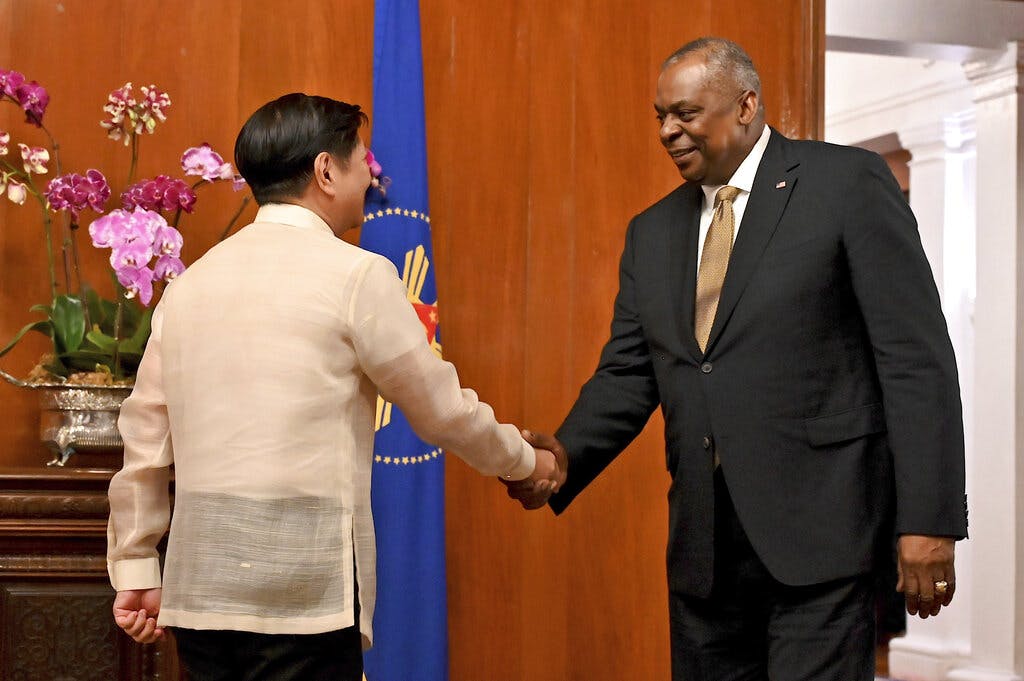Manila Skeptics Wary of Washington Embrace Amid Beijing Bullying
America ‘stands with our Philippine allies,’ the state department says, but it did little when Chairman Xi’s naval forces in the early 2010s began to annex parts of the South China Sea that neighbors claimed as their own.

What a difference a decade makes. As Beijing’s bullying of its neighbors escalates, Washington on Monday declared it would defend the Philippines militarily. Yet, because America in the past has been far less bold in similar disputes, Manila skeptics must wonder how committed it is now.
America “stands with our Philippine allies,” the state department spokesman, Ned Price, said in a statement Monday. “An armed attack on Philippine armed forces, public vessels, or aircraft, including those of the Coast Guard in the South China Sea, would invoke U.S. mutual defense commitments” under a 1951 mutual defense treaty.
Mr. Price was reacting to a February 6 incident at the Second Thomas Shoal, when a Chinese coast guard vessel used a military-grade laser to temporarily blind the crew of a Filipino patrol vessel. Communist China considers the area — and the entire, very busy body of water, the South China Sea — as its private lake even as the Philippines, Vietnam, Malaysia, Taiwan, and Brunei stake claims to parts of it.
In his statement, Mr. Price noted that in 2016 an international tribunal ruled the Second Thomas Shoal was rightfully owned by the Philippines, dismissing the People Republic of China’s claims. That “arbitral decision is final and legally binding on the PRC and the Philippines, and we call upon the PRC to abide by the ruling,” Mr. Price said.
To paraphrase “Casablanca” and Rick Blaine, “I wouldn’t bring up that arbitration, it’s poor salesmanship.”
In the early 2010s, Chairman Xi’s naval forces began to annex parts of the South China Sea that neighbors claimed as their own. The Philippines have long controlled the Scarborough Shoal and the Second Thomas Shoal. Communist China produced maps that it said proved sovereignty over the fish-rich waters.
At that time President Obama’s administration did not evoke American-Filipino defense treaties, and declined to even take sides on maritime disputes between Communist China and neighboring U.S. allies. Instead, it urged the claimants to go to international arbitration at the Hague. Manila agreed.
In 2016, the Hague tribunal ruled that the disputed waters indeed belonged to the Philippines in what the spokesman for the state department at the time, John Kirby, hailed as “an important contribution to the shared goal of a peaceful resolution to disputes in the South China Sea.”
One big problem: The ruling was immediately dismissed by Beijing. Communist China went on to build military bases at several South China Sea spots it took over by force. It proceeded to throw its weight around the region, ignoring “international law,” a phrase favored by members of the Obama administration.
Washington then topped its dillydallying with a refusal to sell arms to the Philippines, which promoted the blunt-spoken newly elected Philippine president, Rodrigo Duterte, to say, “You can go to hell, Mr. Obama.” He announced Manila would instead buy arms from Russia and make Communist China its top ally.
Are things different now? “America’s pivot to Asia is finally happening,” an international relations professor at Johns Hopkins university, Hal Brands, wrote recently on Bloomberg. “Diplomatically, economically and militarily, the US is taking competition with China seriously.”
As the State Department’s latest statement indicates, the current administration indeed seems intent on repairing relations with the Philippines and other Asian allies that may have felt spurned by earlier American policies.
Yet, as a region watcher at the Foundation for Defense of Democracies, Cleo Paskal, notes, some of the architects of Mr. Obama’s past policies now man similar positions in the current administration. Notably, the Pacific region coordinator for Mr. Obama’s state department, Kirk Campbell, now holds the same position at the national security council. Mr. Kirby has moved to the White House from the state department.
The Philippines and others in the Pacific rely on the Biden administration in some ways, but are leery of others, Ms. Paskal told the Sun. “The Department of Defense has elicited enough trust for Manila to say, ‘Okay, you can come back in.’ The trust deficit is primarily with the state department.”
The current Filipino president, Ferdinand “Bongbong” Marcos, is beginning to reverse his predecessor’s pivot to Communist China. Following the February 6 incident at the Second Thomas Shoal, he summoned the Chinese ambassador to Manila for a dressdown. Earlier this month he signed an agreement with Washington to allow American access to nine military bases in the Philippines, from where they had been chased three decades ago .
With Mr. Marcos turning to America, Communist China has “put a target on his back,” Ms. Paskal said. As it does elsewhere in the Pacific, she adds, Beijing will now bolster his domestic opponents. She says “an enormous amount of the Filipino elite is in China’s back pocket. If America doesn’t come through, he will be in trouble.”
Adding Manila to a group of countries that fear Communist China enough to ally with America could be an important step as Washington deals with Cold War II — as long as Mr. Biden can overcome America’s well-earned trust deficit.

